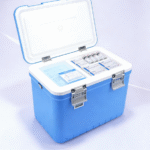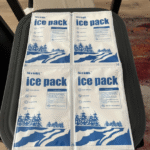¿Congelas paquetes de hielo seco?? Una guía completa para uso seguro
Paquetes de hielo seco son una solución conveniente para el envío y la preservación sensible a la temperatura, pero ¿deberías congelarlos antes de usar? Este artículo desglosa si es necesario congelar, Cómo almacenar hielo seco de forma segura, y las mejores prácticas para garantizar un frío duradero para sus bienes.

Este artículo responderá:
-
¿Deberías congelar paquetes de hielo seco antes de usar??
-
¿Cómo se almacena paquetes de hielo seco para evitar sublimación??
-
¿Cuál es la mejor manera de usar paquetes de hielo seco para el envío??
-
¿Cómo se comparan las paquetes de hielo secos con las paquetes de hielo de gel o líquidos??
¿Deberías congelar paquetes de hielo seco antes de usar??
No, No necesita congelar paquetes de hielo secos antes de usarlas. El hielo seco en sí ya está congelado a -78.5 ° C, y congelar paquetes de hielo seco puede arriesgarse a la acumulación de presión innecesaria en contenedores cerrados. En cambio, almacenar hielo seco en un bien ventilado, contenedor aislado para administrar la sublimación correctamente.
Si planea almacenar los paquetes durante períodos prolongados, Evite sellarlos en recipientes apretados ya que el gas de sublimación necesita una ruta de escape. Una tapa parcialmente cerrada o orificio de ventilación asegura una sublimación segura y evita la acumulación de presión peligrosa.
Consejos clave de almacenamiento de hielo seco
| Método de almacenamiento | Eficacia | El mejor uso | Por qué funciona para ti |
|---|---|---|---|
| Refrigerador aislado | 6–12 horas | Transporte o almacenamiento a corto plazo | Mantiene la sublimación lenta, temperatura estable |
| Contenedor ventilado | 24+ horas | Envío extendido | Libera Co₂ mientras preserva la integridad de la cadena de frío |
| Bolsas de plástico sin sellar | 4–6 horas | Viajes cortos, acceso rápido | Fácil de empacar, sublimate más rápido |
¿Cómo se almacena paquetes de hielo seco para evitar sublimación??
Las paquetes de hielo secos requieren técnicas de almacenamiento específicas para minimizar la sublimación. Mantenerlos en contenedores herméticos provoca una acumulación de presión rápida, que puede conducir a accidentes. El método ideal es almacenarlos en contenedores que permitan que el gas escape, tales como cajas aisladas con tapas ventiladas.
Si estás transportando hielo seco por más de un día, Asegúrese de usar un refrigerador o caja con un sello ventilado que permita que CO₂ escote lentamente. Si solo almacena hielo seco durante unas horas, Simplemente use un refrigerador estándar sin sellarlo demasiado bien.
Comparación de sublimación de hielo seco
| Método | Duración del enfriamiento | Eficiencia | Recomendación de almacenamiento |
|---|---|---|---|
| Sello apretado | 2–3 horas | Bajo | Riesgo de acumulación de presión, Usar solo por períodos cortos |
| Agujero de ventilación | 12–24 horas | Alto | Sublimación lenta, Lo mejor para el transporte |
| Caja aislada | 24+ horas | Excelente | Mantener helado seco para viajes o eventos largos |
¿Cuál es la mejor manera de usar paquetes de hielo seco para el envío??
Las paquetes de hielo secos son perfectas para mantener los envíos sensibles fríos. Para usarlos de manera efectiva, Coloque el hielo seco en envases aislados con una tapa ventilada. Asegúrese de que el hielo seco se coloque en la parte superior o a lo largo de los lados de sus productos para distribuir uniformemente el frío.
Es esencial mantener el peso total del hielo seco dentro de los límites establecidos por los transportistas de envío (Por lo general, 5 kg por paquete para la mayoría de los fletos aéreos). Siempre use una etiqueta sensible a la temperatura para notificar al controlador que su paquete contiene hielo seco.
Consejos de envío para hielo seco
-
Envío internacional: Asegúrese de que el paquete esté bien marcado y el hielo seco se ventile adecuadamente para cumplir con las regulaciones de IATA.
-
Entregas de comercio electrónico: Use 5–10 lb de hielo seco por volumen más frío para mantener artículos congelados para hasta 48 horas.
-
Alimentos perecederos: Empaque el hielo seco con cuidado para evitar el contacto directo con los alimentos, prevenir las quemaduras del congelador.
Caso del mundo real: Un distribuidor de alimentos gourmet mejoró el tiempo de entrega y redujo el deterioro mediante el uso de paquetes de hielo secos en lugar de paquetes de gel para entregas de 48 horas, reducir los costos generales por 15%.
¿Cómo se comparan las paquetes de hielo secos con las paquetes de hielo de gel o líquido??
Las paquetes de hielo secos proporcionan temperaturas más frías y duraciones de enfriamiento más largas que las paquetes de hielo de gel o líquido. Los paquetes de gel son mejores para mantener temperaturas alrededor de 0 ° C a 5 ° C, pero no alcanzan las bajas temperaturas extremas de hielo seco, que es ideal para bienes congelados y farmacéuticos.
La principal diferencia radica en la tasa de sublimación. El hielo seco se sublima en gas co₂, mientras que los paquetes de gel o líquidos se derriten en agua. El hielo seco es más adecuado para envíos más largos y entornos de alta temperatura, donde puede ofrecer un enfriamiento constante para hasta 24 horas.
Comparación de opciones de enfriamiento
| Tipo de hielo | Rango de temperatura | Duración | Mejor para |
|---|---|---|---|
| Hielo seco | −78.5 ° C | 6–24 horas | Envío de productos congelados, productos farmaceuticos |
| Paquete de hielo en gel | 0° C a 5 ° C | 4–6 horas | Refriamiento a corto plazo para alimentos perecederos |
| Paquete de hielo líquido | 1°C a 4°C | 4–8 horas | Pequeños envíos o artículos que no necesitan congelar |
2025 Tendencias en el uso y almacenamiento de la manada de hielo seco
Por 2025, paquetes de hielo secos compuestos La incorporación de materiales biodegradables y las membranas de ventilación se han convertido en la corriente principal en el envío. Estas innovaciones evitan los desechos al tiempo que reducen el impacto ambiental. Además, Sistemas de seguimiento de hielo seco inteligente se están volviendo más comunes en el comercio electrónico, Ofrecer monitoreo de temperatura y sublimación en tiempo real.
Últimos desarrollos de un vistazo
-
Sensores inteligentes de hielo seco: Monitoreo en tiempo real para evitar sublimación y garantizar un tránsito seguro.
-
Embalaje biodegradable: Una creciente demanda de soluciones sostenibles de envío de hielo seco.
-
Materiales de cambio de fase (PCM): Utilizado junto con hielo seco para mantener temperaturas específicas por más tiempo.
Insight del mercado: Los gigantes de comercio electrónico han comenzado a usar hielo seco en combinación con la tecnología PCM para extender la vida útil de los alimentos congelados hasta 25%, mientras reduce la huella de carbono por 30%.
Preguntas frecuentes {#preguntas frecuentes}
¿Deben congelarse las paquetes de hielo secos??
No, El hielo seco ya está congelado y no necesita congelación adicional. Sin embargo, debe almacenarse en un contenedor ventilado para permitir sublimación.
¿Cuánto duran las paquetes de hielo secos??
Las paquetes de hielo secos duran de 6 a 24 horas dependiendo del método de almacenamiento y la temperatura externa. Use un refrigerador aislado con ventilación para obtener mejores resultados.
¿Puedo enviar hielo seco a nivel internacional??
Sí, pero debe ser etiquetado y empaquetado de acuerdo con las regulaciones de envío internacional, incluyendo reglas de IATA para hielo seco.
Resumen & Recomendaciones
Para usar de forma segura paquetes de hielo seco, siempre guárdelos en contenedores ventilados, Evite congelarlos nuevamente, y adherirse a las regulaciones de envío. El hielo seco sobresale en enfriamiento de larga duración, haciéndolo ideal para bienes congelados y productos farmacéuticos.
Siguientes pasos:
-
Planifique sus necesidades de envío y elija el tamaño de hielo seco correcto.
-
Asegure una ventilación adecuada en enfriadores para sublimación segura.
-
Utilice un sistema de monitoreo de hielo seco inteligente para envíos confidenciales.
Acerca de Tempk
Y tempk, Nos especializamos en soluciones de cadena de frío y envases con temperatura controlada, Asegurar que sus productos permanezcan a la temperatura óptima durante todo el tránsito. Con 30 patentes En tecnología de hielo seco, Proporcionamos seguro, Opciones de envío sostenibles.
Contáctenos hoy para obtener asesoramiento experto en cadena de frío y soluciones personalizadas.























